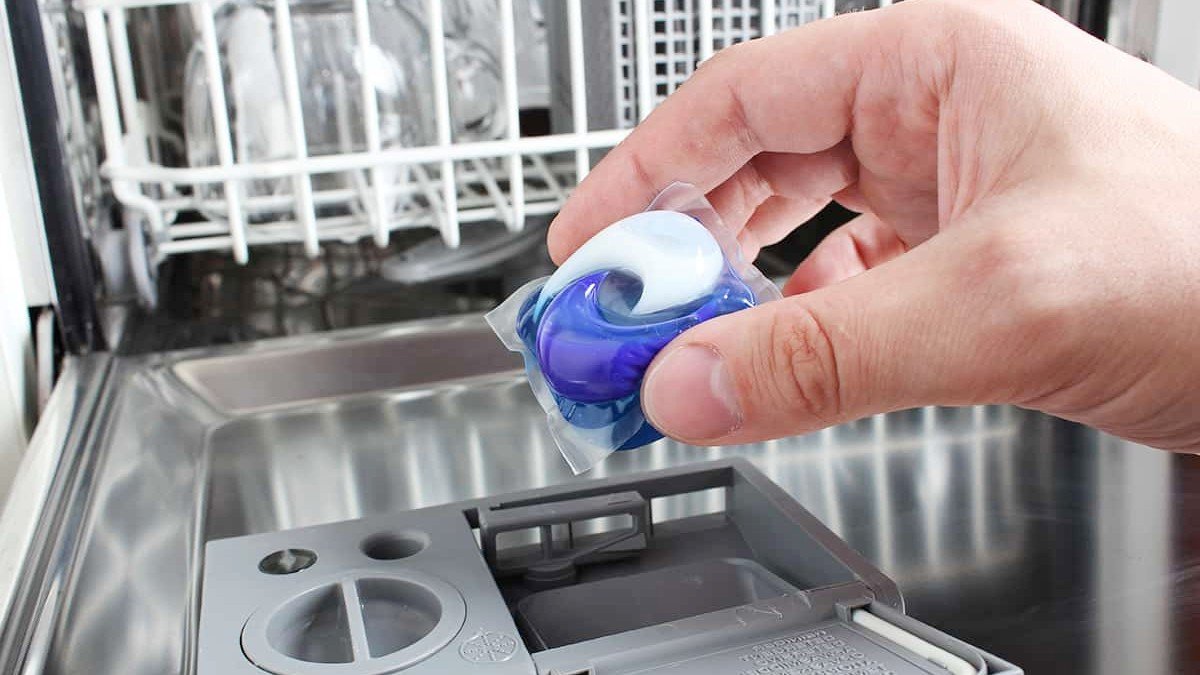Are Dishwasher Pods Environmentally Safe?

In recent years many people have switched from traditional dishwasher detergents to easy-to-use, pre-measured dishwasher pods.
As their use has become more widespread, concerns about their potential environmental impact have arisen, prompting further investigation into the composition and ecological safety of these products.
What are dishwasher pods made out of?
Dishwasher pods are small, one-time-use capsules that are filled with a concentrated detergent mixture that is meant to dissolve in water while washing dishes. This mixture typically includes enzymes, surfactants, and other cleaning agents.
The water-soluble film, often made of polyvinyl alcohol (PVA), is engineered to dissolve rapidly in water, releasing the detergent to effectively clean dishes.
Even though PVA dissolves in water, its biodegradability and possible effects on aquatic ecosystems are still being discussed.
Research has shown that PVA can dissolve in water, but it might not break down completely in water treatment plants. Because of this, microplastic particles can be released into the environment.
This makes scientists worry about how safe dishwasher pods are for the environment and has led to calls for a closer look at the manufacturing process and the creation of more environmentally friendly alternatives.
Are dishwasher pods environmentally friendly and safe?
There’s no denying that such pods are convenient, but the damage they do to the environment has become a pressing concern.
Although the PVA film used in these pods is technically biodegradable, it can take several weeks to break down in water treatment plants. This slow process raises questions about how good dishwasher pods are for the environment and how they might affect water systems.
Additionally, dishwasher tablets often have phosphates in them, which can be bad for aquatic life if they get into the water.
Algae can grow because of phosphates, which can reduce the amount of oxygen in water systems and hurt fish and other aquatic animals. This new worry shows that dishwasher pods and their safety for the environment need to be looked at more closely.
Do dishwasher pods contribute to microplastics?
It has been found that the PVA film used in dishwasher tablets could be a source of microplastic pollution in waterways.
Even though PVA is usually thought to be biodegradable, it may not break down completely, causing small pieces of plastic to form. Microplastics could be eaten by aquatic organisms, which could cause them to get into the food chain and harm ecosystems.
Microplastics getting out of dishwasher pods is becoming a bigger problem that needs to be looked into more.
As our knowledge of how microplastics affect the environment grows, it is important to find and fix potential pollution sources, like dishwasher pods, to protect aquatic ecosystems and keep the environment in balance.
Are there any other cons of dishwasher pods?
Aside from what they do to the environment, dishwasher pods may also be dangerous, especially for children.
The bright, candy-like appearance of these pods has led to numerous incidents of accidental ingestion, resulting in severe injuries and even fatalities. This alarming trend has prompted many manufacturers to introduce child-resistant packaging and warning labels to mitigate the risk and ensure consumer safety.
It is essential for consumers to be aware of these potential hazards and store dishwasher pods out of the reach of children.
By doing so, they can prevent accidents while also considering the environmental implications of their choice of dishwasher detergent, ultimately contributing to a safer and more sustainable home environment.
Can you get eco-friendly dishwasher pods?
Eco-friendly dishwasher pods are available for those who want a more sustainable option. These environmentally responsible products often use plant-based ingredients, exclude phosphates, and incorporate biodegradable films in their design.
Choosing eco-friendly dishwasher tablets allows consumers to benefit from their convenience while minimizing their environmental impact.
Furthermore, some brands focus on reducing packaging waste by using materials that can be recycled or composted. These things help make eco-friendly dishwasher pods last longer, which makes them a popular choice among people who care about the environment.
Why should you use eco-friendly dishwasher pods?
Switching to eco-friendly dishwasher pods can help lower your environmental footprint by reducing the number of harmful chemicals and microplastics entering waterways.
These products often come in environmentally friendly packaging, which further decreases their overall impact on the environment.
By using eco-friendly dishwasher tablets, consumers can make a positive difference in preserving aquatic ecosystems and supporting sustainable practices. This change in detergent choice contributes to a greener and more responsible way of living.
Which are the most environmentally friendly dishwasher pods?
Some of the most environmentally friendly dishwasher pods are produced by brands like Ecover, Seventh Generation, and Dropps.
These companies prioritize using plant-based, biodegradable ingredients and minimal packaging to minimize their impact on the environment.
Each of these brands has a strong commitment to sustainability and strives to create products that are both effective and eco-friendly. By choosing such brands, consumers can feel confident that they are making a responsible choice for their household and the planet.
Are there any natural alternatives to dishwasher pods?
Yes, there are natural alternatives to dishwasher pods, such as homemade dishwasher detergent.
These homemade alternatives often use ingredients like baking soda, washing soda, and citric acid, which are environmentally friendly and cost-effective compared to commercial dishwasher tablets.
A simple recipe for homemade dishwasher detergent includes the following ingredients:
- 1 cup washing soda
- 1 cup baking soda
- 1/2 cup citric acid
- 1/2 cup kosher salt
To make the detergent, simply mix all the ingredients together in a large bowl until well combined. Put the mixture in a container that won’t let air in and use about 1 tablespoon per a load of dishes.
Although dishwasher pods offer convenience, their environmental impact cannot be ignored. The potential release of microplastics, the presence of phosphates, and safety concerns for children make it essential to consider eco-friendly alternatives.
By opting for environmentally friendly dishwasher pods or natural alternatives, you can contribute to a healthier environment and a more sustainable future for the planet.
